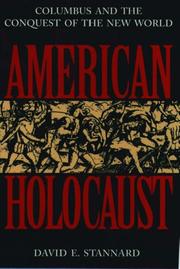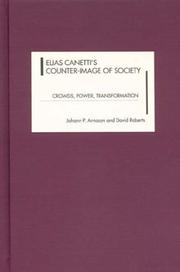| Listing 1 - 10 of 12 | << page >> |
Sort by
|
Book
ISBN: 0500320322 0500330328 9780500320327 Year: 1974 Publisher: London,
Abstract | Keywords | Export | Availability | Bookmark
 Loading...
Loading...Choose an application
- Reference Manager
- EndNote
- RefWorks (Direct export to RefWorks)
Europe --- Council of Europe countries --- Eastern Hemisphere --- Eurasia --- History --- -European civilization, 1848-1875 --- -European civilization, 1848-1875. --- European civilization, 1848-1875. --- -Europe --- History -
Book
Year: 1976 Publisher: L'Aquila : Japadre,
Abstract | Keywords | Export | Availability | Bookmark
 Loading...
Loading...Choose an application
- Reference Manager
- EndNote
- RefWorks (Direct export to RefWorks)
Italian literature --- European civilization --- D'Annunzio, Gabriele. --- D'Annunzio, Gabriele,
Book
Year: 1977 Publisher: Cambridge : Cambridge University Press,
Abstract | Keywords | Export | Availability | Bookmark
 Loading...
Loading...Choose an application
- Reference Manager
- EndNote
- RefWorks (Direct export to RefWorks)
EUROPEAN CIVILIZATION --- CIVILISATION EUROPEENNE --- 19E CENTURY --- HISTOIRE --- 19E SIECLE
Book
ISBN: 0140216707 Year: 1973
Abstract | Keywords | Export | Availability | Bookmark
 Loading...
Loading...Choose an application
- Reference Manager
- EndNote
- RefWorks (Direct export to RefWorks)
#ABIB:atte --- #BIBC:bibl.Reekmans --- |02464/B --- Civilization, Ancient. --- Radiocarbon dating. --- Prehistoric European civilization --- Theories --- Influence of radiocarbon dating of prehistoric antiquities. --- Man, Prehistoric.
Book
ISBN: 9782082105897 208210589X Year: 2007 Publisher: Paris: Flammarion,
Abstract | Keywords | Export | Availability | Bookmark
 Loading...
Loading...Choose an application
- Reference Manager
- EndNote
- RefWorks (Direct export to RefWorks)
Degeneration --- Regression (Civilization) --- Philosophy, European --- History --- Europe --- Civilization --- European civilization and cultural crisis --- Philosophical essay --- Sociology of culture --- Degeneration. --- History. --- Civilization. --- Philosophical essay. --- Philosophy, European - History --- Europe - Civilization

ISBN: 0195075811 Year: 1992 Publisher: New York Oxford Oxford University Press
Abstract | Keywords | Export | Availability | Bookmark
 Loading...
Loading...Choose an application
- Reference Manager
- EndNote
- RefWorks (Direct export to RefWorks)
Behandeling van de Indianen --- Indianen [Behandeling van de ] --- Indians [Treatment of ] --- Indiens [Traitement des ] --- Traitement des Indiens --- Treatment of Indians --- Columbus, Christopher --- Influence --- America --- Discovery and exploration --- Spanish --- Indians --- First contact with European civilization --- CONQUETE DE L'AMERIQUE --- AMERIQUE --- INDIENS, ATTITUDES ENVERS LES --- CIVILISATIONS PRECOLOMBIENNES --- INDIENS (TRAITEMENT DES) --- DECOUVERTE ET EXPLORATION

ISBN: 1571131604 9786611949143 1281949140 1571136363 Year: 2004 Publisher: Rochester (N.Y.) : Camden House,
Abstract | Keywords | Export | Availability | Bookmark
 Loading...
Loading...Choose an application
- Reference Manager
- EndNote
- RefWorks (Direct export to RefWorks)
The award of the Nobel Prize for literature in 1981 has seemingly assured Elias Canetti's place in literary history. But his significance as a cultural critic has not been adequately recognized. The present study redresses this situation in two ways: by mapping the counter-image of human existence, history, and society that informs Canetti's critique of the modern world and its sciences; and by opening up Canetti's hermetic oeuvre by tracing his cryptic and often concealed dialogue with major figures within the Western tradition such as Hobbes, Durkheim, and Freud and contemporaries such as Adorno, Arendt, and Elias. The authors ask how Canetti's alternative vision of man and society relates to important themes of twentieth-century social and civilizational thought even as it calls into question fundamental assumptions of the social and human sciences. In analyses of 'Auto da Fé, Crowds and Power,' and the aphorisms, the authors elucidate key aspects of Canetti's interrogation of human existence and human history across five thematic complexes: individual and social psychology, totalitarian politics, religion and politics, theories of society, and power and culture. They thus trace the movement of Canetti's thought from an apocalyptic sense of crisis to his search for cultural resources to set against the holocaust of European civilization. Johann P. Arnason teaches sociology at La Trobe University, Melbourne and David Roberts is Emeritus Professor of German at Monash University, Melbourne.
Canetti, Elias, --- Criticism and interpretation. --- Political and social views. --- Canetti, Elias --- Kanetti, Elias, --- Канети, Елиас, --- Kaneti, Elias, --- LITERARY CRITICISM / European / German. --- Civilization. --- Counter-Image. --- Crowds. --- Cultural Critic. --- Cultural Resources. --- Elias Canetti. --- European Civilization. --- History. --- Holocaust. --- Human Existence. --- Modern World. --- Power. --- Religion. --- Social Psychology. --- Society. --- Totalitarian Politics. --- Transformation. --- Twentieth-Century Thought. --- Western Tradition.
Book
ISBN: 9798887191768 9798887191775 Year: 2023 Publisher: Boston, MA
Abstract | Keywords | Export | Availability | Bookmark
 Loading...
Loading...Choose an application
- Reference Manager
- EndNote
- RefWorks (Direct export to RefWorks)
This is the first study in English of the vast literary output of Catherine the Great. "Empress Catherine II produced a body of written material so vast and diverse that it seems impossible to provide a general characterization of the works contained in the authoritative twelve-volume collection assembled by A. N. Pypin from handwritten source material. This book does not attempt an all-embracing review of Catherine's entire literary output, which consists of works in multiple genres and languages. The Russian empress's writings have been the repeated subject of serious analysis for nineteenth- and twentieth-century researchers; all of these in one way or another demonstrate that across a variety of genres and formats, with a greater or lesser degree of independence and originality, the literary works of Catherine II always express her politics and ideology. If Catherine's policy had the transfer of imperial power to Russia, a kind of translatio imperii, as its strategic goal, then the literary and cultural accomplishments of the empress had to establish a translatio studii, that is, the transfer of the Roman cultural paradigm, knowledge, and civilization onto Russian soil. This book will be devoted to an analysis of these paradigms as they emerged between Catherine II's creations on the page and in the empire itself"-- ǂc Provided by publisher.
Russian literature --- Politics and literature --- Enlightenment --- History and criticism --- Women authors --- History and criticism. --- Catherine II, --- Criticism and interpretation. --- Political and social views. --- Russia --- Civilization --- Politics and government --- Catherine --- Russian Empire, 18th century, political symbolism, literary studies, European Civilization, Russia vs. Europe, the royal history, Catherine the Great.
Book
ISBN: 1283277298 0520947517 9786613277299 9780520947511 9781283277297 9780520247987 0520247981 9780520267497 0520267494 6613277290 Year: 2011 Publisher: Berkeley, Calif. University of California Press
Abstract | Keywords | Export | Availability | Bookmark
 Loading...
Loading...Choose an application
- Reference Manager
- EndNote
- RefWorks (Direct export to RefWorks)
The Other West provides a provocative new interpretation of Latin American history and the region's place in the changing global political economy, from the discovery of America into the twenty-first century. Marcello Carmagnani's award-winning and multidisciplinary analysis sheds new light on historical processes and explains how this vast expanse of territory--stretching from the American Southwest to the tip of the Southern Cone--became Europeanized in the colonial period, and how the European and American civilizations transformed one another as they grew together. Carmagnani departs from traditional historical thought by situating his narrative in the context of world history, brilliantly showing how the Iberian populations and cultures--both European and American--merged and evolved.
World history. --- International relations --- History. --- Latin America --- Relations. --- 21st century. --- american civilization. --- american southwest. --- colonial period. --- cross cultural. --- cultural evolution. --- culture and history. --- discovery of america. --- european civilization. --- european colonization. --- global politics. --- globalization. --- historical perspective. --- historical processes. --- history buffs. --- iberian culture. --- iberian populations. --- invasion. --- latin america. --- latin american culture. --- latin american history. --- multidisciplinary analysis. --- political economy. --- regional history. --- southern cone. --- world history.
Book
ISBN: 9798887191775 Year: 2023 Publisher: Boston, MA
Abstract | Keywords | Export | Availability | Bookmark
 Loading...
Loading...Choose an application
- Reference Manager
- EndNote
- RefWorks (Direct export to RefWorks)
This is the first study in English of the vast literary output of Catherine the Great. "Empress Catherine II produced a body of written material so vast and diverse that it seems impossible to provide a general characterization of the works contained in the authoritative twelve-volume collection assembled by A. N. Pypin from handwritten source material. This book does not attempt an all-embracing review of Catherine's entire literary output, which consists of works in multiple genres and languages. The Russian empress's writings have been the repeated subject of serious analysis for nineteenth- and twentieth-century researchers; all of these in one way or another demonstrate that across a variety of genres and formats, with a greater or lesser degree of independence and originality, the literary works of Catherine II always express her politics and ideology. If Catherine's policy had the transfer of imperial power to Russia, a kind of translatio imperii, as its strategic goal, then the literary and cultural accomplishments of the empress had to establish a translatio studii, that is, the transfer of the Roman cultural paradigm, knowledge, and civilization onto Russian soil. This book will be devoted to an analysis of these paradigms as they emerged between Catherine II's creations on the page and in the empire itself"-- ǂc Provided by publisher.
Russian literature --- Politics and literature --- Enlightenment --- Russia --- History and criticism. --- Women authors --- Civilization --- Politics and government --- Catherine --- Criticism and interpretation. --- Political and social views. --- Russian Empire, 18th century, political symbolism, literary studies, European Civilization, Russia vs. Europe, the royal history, Catherine the Great.
| Listing 1 - 10 of 12 | << page >> |
Sort by
|

 Search
Search Feedback
Feedback About UniCat
About UniCat  Help
Help News
News